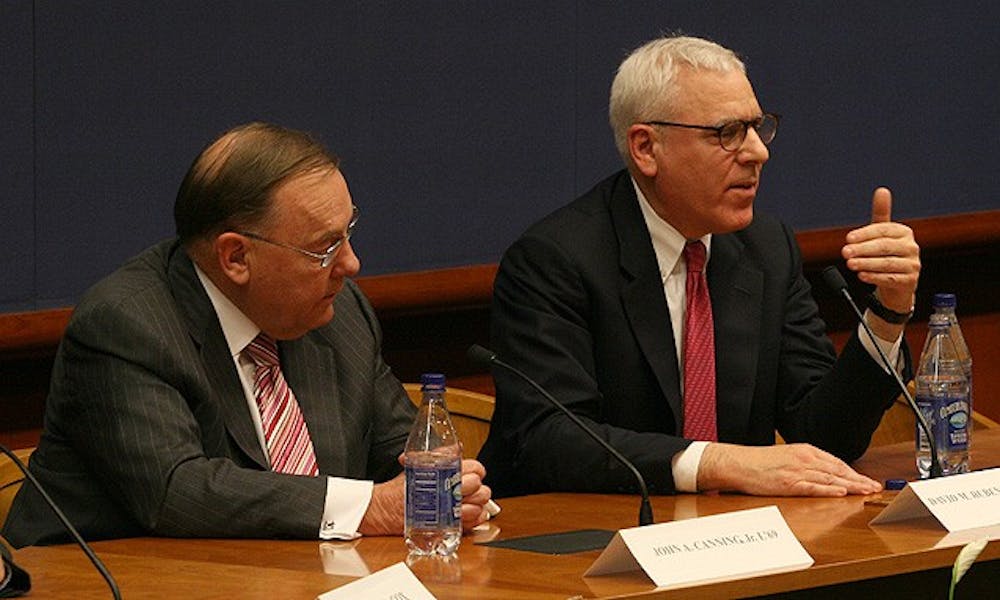A group of leading investors discussed lessons learned from the financial crisis in the School of Law Thursday.
John Canning Jr., Law ’69 and co-founder and chairman of Madison Dearborn Partners, joined billionaire David Rubenstein, Trinity ’70 and co-founder and managing director of The Carlyle Group, one of the world’s largest private equity firms. Gao Xiqing, Law ’86, and Tony James, president and chief operating officer of The Blackstone Group, joined the panel toward the event’s end following flight delays. Both Rubenstein and Xiqing, president and chief investment officer of the China Investment Corporation, are in Durham this weekend for the Board of Trustees meeting.
The panelists offered unique perspectives on the economy. They detailed their own missteps during the financial crisis, describing the economic meltdown in terms of their own experiences. Canning, Xiqing and moderator James Cox, Brainerd Currie Professor of Law, participated in a similar panel in December 2008, in the middle of the financial crisis and shortly after the fall of Lehman Brothers.
“I was in here in December 2008, and no one was feeling too happy then,” Canning said, adding that he remembers feeling “down” and worrying about his own firm’s solvency.
Canning and Rubenstein recalled the period prior to the recession when private equity deals reached a peak, and firms continued to make deals even as they acknowledged a recession was in the near future. The temptations for record-breaking profits blinded many financiers from the looming risks.
“Our severest downside cases were not severe enough,” Canning said.
Toward the end of the discussion, Cox asked the panelists what worried them most as the country emerges from the downturn.
“There’s a fear of whether people will remember,” Canning said of past mistakes that led to the recession.
President Richard Brodhead, who also attended the event, calling the discussion an excellent opportunity to learn in an interview after the panel.
“Half of these people were here during the darkest downturn of 2008, and it is fascinating to be able to tune back in and see how the world is doing now,” Brodhead said. “These are probably four of the most articulate people that I have ever been in the same room with. It’s just a powerful jolt of education.”
Aside from discussion of the economic downturn, Rubenstein spoke about his recent $21.3 million purchase of an authentic copy of the Magna Carta that dates back to 1297. Rubenstein noted the document served as inspiration to former President Thomas Jefferson and helped shape early American political philosophy. In recognition of its significance to the country, he donated the document to the National Archives Museum in Washington, D.C.
The crowd broke out in laughter when Rubenstein recalled donating a rare copy of the Emancipation Proclamation to the White House, where the document now resides in the Oval Office.
“I thought it belonged in Lincoln’s bedroom.... But the White House said no one would see it there. It wasn’t the Clinton Administration, and no one goes in there anymore,” Rubenstein joked.
Get The Chronicle straight to your inbox
Sign up for our weekly newsletter. Cancel at any time.

